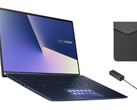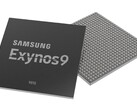In case you missed it, the Core i9-9900KS is a special edition of the Core i9-9900K. Intel announced the i9-9900KS at Computex 2019, with the company claiming that the processor can achieve an all-core boost of 5 GHz. By contrast, the Core i9-9900K can only reach that on a single core, with it only capable of hitting 4.7 GHz on all its eight cores simultaneously. Incidentally, the Core i9-9900KS has a 4.0 GHz base clock, 400 MHz higher than that of the Core i9-9900K.
Last month we reported on the Core i9-9900KS falling short of the Ryzen 7 3800X in Geekbench, despite the latter apparently running on an older X370 chipset. Someone had managed to get the former to score more in Geekbench a few days later though. Now, a 3DMark Fire Strike listing has appeared for the upcoming Coffee Lake processor and is not good news for Intel. The benchmark does not report the thermal design power (TDP) of the Core i9-9900KS, which still remains a mystery, but it does confirm that the CPU has a 4.0 GHz base clock and can reach 5 GHz, specifically 5.027 GHz. This, of course, is not the bad news.
The test system in which the Core i9-9900KS installed featured 16 GB of Samsung DDR4 2,678 MHz RAM, a 250 GB Samsung 860 EVO SSD and a GeForce RTX 2080 Ti, for reference. The latter component is significant, as it limits our comparisons with CPUs in our database somewhat. Unsurprisingly, GPUs do affect Fire Strike scores, with the Ryzen 7 2700X scoring over 4,500 points fewer when paired with a Radeon RX Vega 64 than with a GeForce RTX 2080 SUPER. We use an RX Vega 64 for our CPU reviews where possible, so it would be unfair to compare even the Core i9-9900K that we have tested with this Core i9-9900KS 3DMark listing.
Thankfully, the 3DMark website contains many results of modern CPUs paired with the RTX 2080 Ti, although we should stress that we cannot confirm the authenticity of individual results. As the screenshot below shows, the Core i9-9900KS scored 28,709 in Fire Strike at 1080p, which is around 8% shy of the Ryzen 7 3700X and Ryzen 9 3900X, which typically score around 29,900 points. We came to this figure by taking the average from the first 50 results on 3DMark, for reference.
However, the Ryzen 7 3700X scores up to 30,553, with the Ryzen 9 3900X peaking at 31,415. These results put the Core i9-9900KS up to 12% behind the latter and 9% short of the former, despite the Coffee Lake chip have a much higher all-core boost clock than its Zen 2 competitors. Delving deeper reveals that the average Ryzen 9 3900X scores around 38,000 in Fire Strike Graphics and 30,000 in Fire Strike Physics when working with an RTX 2080 Ti, which smokes the Core i9-9900KS.
Naturally, we will put the Core i9-9900KS through its paces if we get our hands on one, and we would always recommend being slightly sceptical of unverified benchmark listings. Hence, take these results as an indication of what the Core i9-9900KS can do, and that perhaps clock speeds are not all they are cracked up to be.
Source(s)
3DMark via @TUM_APISAK


 Deutsch
Deutsch English
English Español
Español Français
Français Italiano
Italiano Nederlands
Nederlands Polski
Polski Português
Português Русский
Русский Türkçe
Türkçe Svenska
Svenska Chinese
Chinese Magyar
Magyar


























